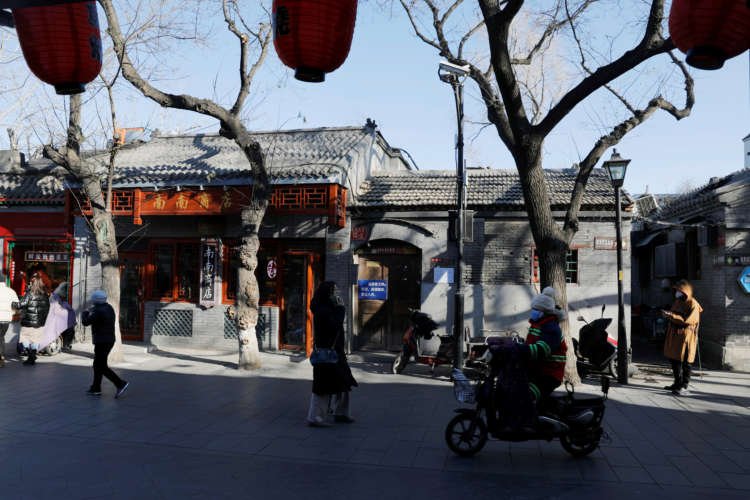China worries about lagging consumption as broader economy shakes off COVID
Published by linker 5
Posted on January 20, 2021
4 min readLast updated: January 21, 2026

Published by linker 5
Posted on January 20, 2021
4 min readLast updated: January 21, 2026

By Gabriel Crossley and Kevin Yao
BEIJING (Reuters) – China will be looking to tweak its economic policies to get consumers to spend more, policy advisers in Beijing said after retail sales emerged as a weak spot in better-than-expected GDP data, underlining the need for reform.
They said that while supporting employment was key in the short run, reforms to help fatten ordinary people’s wallets were needed to boost domestic spending – a priority for President Xi Jinping’s “dual circulation” strategy to cut China’s reliance on overseas markets.
“We need to discuss ways to boost incomes,” said Yao Jingyuan, an adviser to the Chinese cabinet. “Who doesn’t spend if they’re rich?”
The advisers are influential in Beijing, and their recommendations are likely to be considered. Calls for deepening reforms to spur domestic consumption have been rising since Xi unveiled the dual circulation strategy last year.
Allowing more migration to cities, increasing the minimum wage, and easing restrictions like one on the sale of cars in big metros could be some of the policy initiatives to be considered, the advisers said.
China’s economy grew 2.3% in 2020, according to official data this week, making it likely the only major economy that expanded last year.
But retail sales fell 3.9% over the full year, marking the first contraction since 1968, and final consumption dragged on growth for the first time in at least four decades, the data showed.
(Graphic: Consumption drags on growth for first time since 1978: https://graphics.reuters.com/CHINA-ECONOMY/CHART/jznpnmxbovl/chart.png)
Worryingly for policymakers, retail sales rose just 4.6% on year in December, missing expectations and slowing for the first time since steadily accelerating from the pandemic-induced slump the previous winter.
Incomes from catering fell by 16.6% in 2020, and people’s average spending on education, culture and entertainment dropped by nearly a fifth.
Lost wages, more saving, job losses, and continued fears over COVID-19 accounted for much of the sluggish consumption, analysts said. They warned that if sustained, the slowdown could drag on economic recovery and jeopardize goals to rebalance the economy away from wasteful infrastructure investment and polluting industry.
Officials tout the vast potential of China’s market – 1.4 billion people strong, with 400 million middle class consumers – but many of them have become wary amid the pandemic, building up precautionary savings.
(Graphic: China’s household savings rise amid pandemic: https://graphics.reuters.com/CHINA-ECONOMY/CHART/nmopaoldapa/chart.png)
JOBS KEY
Policy advisers told Reuters that to boost consumption, incomes need to go up, and for that, jobs are key.
Official surveyed unemployment rates, which economic analysts say under-report actual job losses, rose sharply early in the year before subsiding to 5.2% in December. Although the export sector has seen a recent boom in hiring, analysts say labour demand remains weak in certain sectors, especially services.
“We should start with stabilising employment, because we can boost incomes of ordinary people only when employment is secured,” said Xu Hongcai, deputy director of the economic policy commission at China Association of Policy Science.
Xu said that raising minimum wages, allowing more rural residents to settle in cities, and strengthening social safety nets would help increase earnings, and so spending, in the long run.
Some regulations could also be loosened, said Yao, the cabinet adviser.
“In Beijing and big cities, we still restrict auto purchases…there are no such restrictions in London, New York or Tokyo,” he said.
LINGERING FEARS Incomes suffered under lockdowns and strict movement curbs. Some, especially migrant workers, lost months of wages. Urban disposable income growth slowed to 1.2% in 2020 from 5.0% the previous year.
Consumers chose to fill their bank accounts rather than empty their wallets. Households added 11.3 trillion yuan ($246.69 billion) in new bank savings in 2020, up from 9.7 trillion yuan the previous year, according to central bank data.
Fear of the virus, and continued small-scale outbreaks, continues to dissuade spending.
After a recent rebound in COVID-19 cases in the north of the country, around 30 million people were placed under a form of lockdown. Millions more have been asked to avoid travelling for Lunar New Year, usually a consumption hotspot.
“I won’t go out unless it’s absolutely necessary. This saves me from worry and saves me money too,” said Hou Aiping, a retired woman in her 50s who now only leaves home in Beijing to visit her parents and the supermarket.
“Even though the epidemic is contained, and I always wear my mask, I can’t guarantee I’ll be completely safe,” she said.
($1 = 6.4858 Chinese yuan renminbi)
(Additional reporting by Cheng Leng and Beijing newsroom; Editing by Raju Gopalakrishnan)
Explore more articles in the Business category











